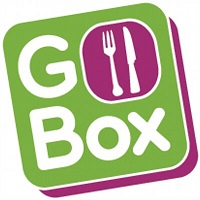If you've ever grabbed your lunch on the run or asked your server to box up your leftover food at the end of a meal at a restaurant, you probably ended up with a food container that you didn't know what to do with. Perhaps you were able to recycle it, or maybe you were forced to throw it away. Wouldn't it be nice if you could simply drop it in a bin on your way home and know that it could be reused many more times?
(Image credit: GoBox)
Idea
Whitehall is home to over 50 restaurants, many of which offer carryout or delivery services. These services are convenient and affordable, and are a desirable amenity for residents. All too often, however the food is packaged in single-use containers which are often made of plastics or styrofoam. These, and even containers made from renewable materials, typically end up in local landfills and can be harmful to wildlife and ecosystems. An opt-in reusable carryout container service could solve the problem of food packaging waste while reducing costs for food vendors and providing a source of jobs for local residents.
Goal
Prevent the disposal of 10,000 single-use carryout containers per year (roughly 30 per day) by replacing them with reusable containers.
Objectives
- Create a coalition of local food service businesses who commit to participate in a container reuse program.
- Recruit local residents, business employees, and other restaurant patrons to be early adopters of the program.
- Recruit a local entrepreneur to start a container reuse business.
- Develop the infrastructure for collecting, cleaning, and redistributing reusable containers.
- Operate and promote the company
Operation of the reusable container service could be a public service, a private service, or a partnership. For example, the city could pursue objectives 1-3 to initiate the effort, then defer operation of the company to the entrepreneur. Alternatively, the city could remain a partner in the company long-term. This would allow the city to retain some control over business decisions and to integrate program expansion into economic development and waste management efforts. There may also be opportunities for city staff to perform some of the day-to-day operations to realize the benefits of economies of scale. For example, strategically-placed collection points could be emptied when city staff empty nearby trash receptacles. Naturally, the terms of the city's involvement should include a financial return proportional to its investment.
Example
GoBox provides subscription-based carryout container reuse services in Portland, Oregon and San Francisco, California. They supply local food vendors with clean containers, which the vendors use when packaging food for GoBox subscribers. When the subscriber is finished with the container, they return it to collection bins located throughout the city, and the company collects the containers, cleans them, and redistributes them to vendors. GoBox provides Apple and Android apps to help subscribers locate participating vendors and container drop boxes. Large companies can even request to have a drop box on-site!
GoBox offers fee-based licensing of their business model to help entrepreneurs in other cities start their own GoBox enterprise. Key assets provided by GoBox include a how-to guide, branding assets, usage of the mobile application, business process tools, and more. City of Whitehall officials can learn more about GoBox licensing from the GO Box Licensing Agreement Term Sheet (password protected).

